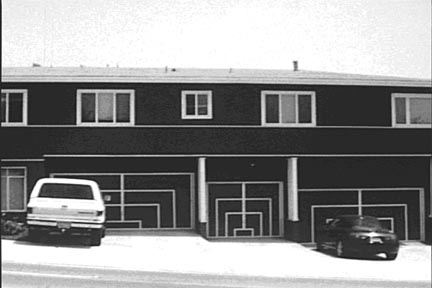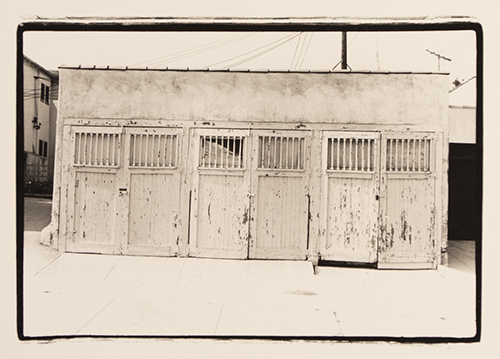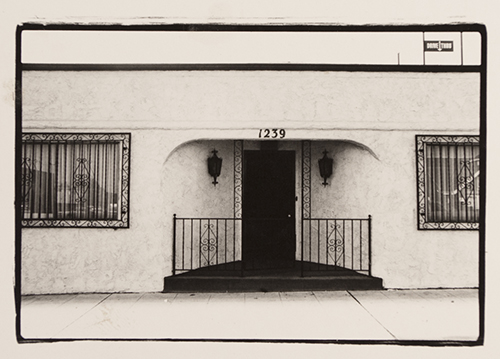About the Photographer
Fiskin, Judy
American, b. 1945
“The End of Photography†(2006) is a super-8 film contemplating the end of black and white analog photography. For the duration of its two-and-a-half minutes, the film shows a sequence of Los Angeles vernacular architecture and landscaping paired with a voice-over of a woman asking, “What was lost?†The voice goes on to inventory the darkroom equipment that will no longer be used with the rise of digital media, the unnamed cause of the end of photography: “no more film, no more canisters… no more enlarger, no more timer, no more safelight,†finally ending with, “no more photography.†Though comprised of still shots, the shakiness of the frames makes it clear that the film was made with a handheld camera, conjuring super-8’s roots in amateur filming. Like black and white photography, super-8 was an accessible medium that could be used for home movies or taken up as a hobby. Fiskin’s film features homes and apartments from the mid-twentieth century, where residents may have used super-8 to document family events after it debuted in the mid-1960s, though the more modern cars indicate a much later time period. In keeping with the technical limitations of the medium, the film’s length of two-and-a-half minutes corresponds to the length of a super-8 reel shot at the industry standard of twenty-four frames per second. Fiskin creates a loose metaphor between the older, and by implication, disappearing mid-century vernacular architecture of Los Angeles and the disappearance of analog photography, shot on the disappearing super-8 film stock. The resulting film is unabashedly nostalgic in emotion and aesthetic but not without irony, since the film is screened and distributed on DVD.
Judy Fiskin completed a bachelor’s degree in art history at Pomona College, Claremont, CA (1966), and a master’s degree in art history at the University of California, Los Angeles (1969). She was the co-director of Womanspace Gallery in Los Angeles in 1973. Her work has been exhibited and screened widely, including at The Modern Museum of Art, New York; the International Center for Photography, New York; the Centre Pompidou, Paris, France; the Mary & Leigh Block Museum of Art, Evanston, IL; and a mid-career retrospective at the Museum of Contemporary Art, Los Angeles (1992). “The End of Photography†has been screened in Paris, Berlin, Kassel, and in Los Angeles at the Getty, the Los Angeles County Museum of Art, the Museum of Contemporary Art, and Angles Gallery. Fiskin is the recipient of numerous awards, including the Silver Spire Award, San Francisco International Film Festival (1998); Distinguished Career in Photography, L.A. Center for Photographic Studies (1995); Individual Artist’s Grant in Photography, National Endowment for the Arts (1990); and Photography Survey Grant, National Endowment for the Arts (1979-1980). Getty Publications will publish a catalogue raisonné of her photographs, “Some Aesthetic Decisions: The Photographs of Judy Fiskin,†in 2011. Fiskin has been on faculty in Photography and Media at the California Institute of the Arts, Valencia, CA, since 1977.



